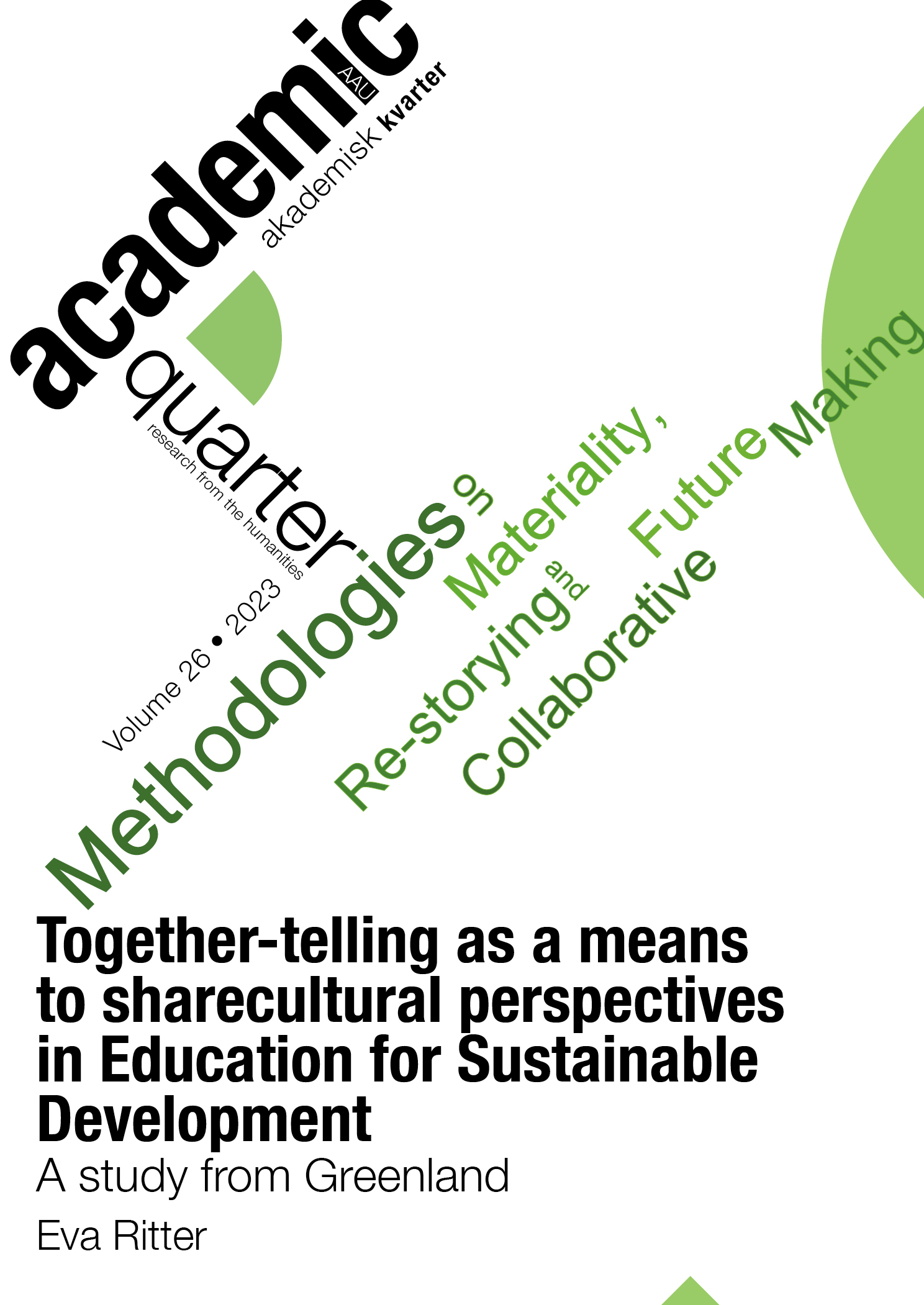Abstract | Abstract
Education for Sustainable Development (ESD) is considered one of the paths leading towards a sustainable future. However, work in ESD must be responsive to the local context and culture in order to be accepted by the people involved. This article examines how together-telling can be used as a means for collaborative future-making in ESD. By reflecting on cultural differences in nature relationships and manners of communication, together-telling is suggested as an approach to give space to voices other than those dominating the global sustainability narratives. The focus is on a respectful way of bringing together and learning from different perspectives of Western-European and Arctic Indigenous cultures in the context of sustainability. A study from Greenland is used as an example from an Indigenous culture in Northern Europe.
Referencer
Berlo, Janet C., and Ruth B. Phillips. 1998. Native North American Art. Oxford: Oxford University Press.
Bohnsack, Ralf. 2010. Rekonstruktive Sozialforschung. Einführung in qualitative Methoden. (8th ed.) Opladen: Verlag Barbara Budrich.
Breithaupt, Fritz. 2022. Das Narrative Gehirn. Was unsere Neuronen erzählen. Berlin: Suhrkamp.
Campell, Joseph, and Bill Moyers. 2001. The Power of Myth, edited by Betty Sue Flowers. New York: Broadway Books.
Choy, Yee Keong. 2017. “Sustainable development: the Nexus of Environmental Sustainability, Values, and Ethics.” European Journal of Sustainable Development 6 (1): 308-324. https://doi.org/10.14207/ejsd.2017.v6n1p308
Danielzik, Chandra-Milena. 2013. “Überlegenheitsdenken fällt nicht vom Himmel. Postkoloniale Perspektiven auf Globales Lernen und Bildung für nachhaltige Entwicklung.“ ZEP Zeitschrift für internationale Bildungsforschung und Entwicklungspädagogik 36 (1): 26-33.
de Haan, Gerhard, 2008. “Gestaltungskompetenz als Kompetenzkonzept der Bildung für nachhaltige Entwicklung.“ In Kompetenzen der Bildung für nachhaltige Entwicklung. Operationalisierung, Messung, Rahmenbedingungen, Befunde, edited by Inka Bormann and Gerhard de Haan. Wiesbaden: VS Verlag für Sozialwissenschaften. https://doi.org/10.1007/978-3-531-90832-8_4
Deleuze, Gilles and Felix Guattari 1987. A thousand plateaus: Capitalism and schizophrenia. University of Minnesota Press.
Gersie, Alida, Anthony Nanson, and Edward Schieffelin (eds.) 2022. Storytelling for Nature Connection: Environment, Community and Story-Based Learning. Hawthorn Press.
Gläser, Jochen, and Grit Laudel. 2009. Experteninterviews und qualitative Inhaltsanalyse. (3rd. ed.) Wiesbaden: Verlag für Sozialwissenschaften.
Harding, Stephan (2009) “Gaia Awareness. Awareness of the animate qualities of the Earth”. In The Handbook of Sustainability Literacy: Skills for a Changing World, edited by Arran Stibbe, 89-93. Totnes: Green Books.
Horkheimer, Max, and Theodor Adorno. 1994. Dialektik der Aufklärung. Philosophische Fragmente. Frankfurt/M: Fischer Wissenschaft.
Jucker, Rolf, and Reiner Mathar. 2015. Schooling for Sustainable Development in Europe. Concepts, Policies and Educational Experience at the End of the UN Decade of Education for Sustainable Development. Springer International Publishing. https://doi.org/10.1007/978-3-319-09549-3
Kruse, Jan. 2014. Qualitative Interviewforschung. Ein integrativer Ansatz. Weinheim: Beltz/ Juventa.
Larsen, Jens, David Boje, and Lena Bruun. 2021. True Storytelling. Seven Principles for an ethical and sustainable change-management strategy. Routledge. https://doi.org/10.4324/9780367425739
Lidegaard, Mads. 1993. Grønlændernes Kristning. Nuuk: Atuakkiorfik
Malone, Karen, Son Truong, and Tonia Gray. 2017. Reimagining Sustainability in Precarious Times. Singapore: Springer. https://doi.org/10.1007/978-981-10-2550-1
Markussen, Ulunnquaq. 2017. “Towards an Arctic Awakening: Neocolonialism, Sustainable Development, Emancipatory research, Collective Action, and Arctic Regional Policymaking.” In: The interconnected Arctic, edited by Kirsi Latola and Hannele Savela. UArctic Congress 2016: 305-311. https://doi.org/10.1007/978-3-319-57532-2_31
Merkel, Johannes. 2015. Hören, Sehen, Staunen. Kulturgeschichte des mündlichen Erzählens. Hildesheim: Georg Olms Verlag.
Nanson, Anthony. 2021. Storytelling and Ecology. Empathy, Enchantment and Emergence in the Use of Oral Narratives. London: Bloomsbury. https://doi.org/10.5040/9781350114951
Powell, Richard C. 2016. “Institutions, Resources, and the Governance of Postcolonial Greenland.” In Governing the North American Arctic. Sovereignty, Security, and Institutions, edited by Dawn Alexandrea Berry, Nigel Bowles, and Halbert Jones. Basingstoke: Palgrave Macmillan. https://doi.org/10.1057/9781137493910_10
Rieckmann, Marco. 2018. “Learning to transform the world: key competencies in Education for Sustainable Development”. In Issues and trends in education for sustainable development, edited by Alexander Leicht, Julia Heiss, and Won Jung Byun, 39-59. UNESCO. https://doi.org/10.54675/YELO2332
Ritter, Eva, and Jens Larsen. 2023. Naturens Lederskab. Arktisk og nordisk storytelling om natursyn, bæredygtighed og mental sundhed. Manual til et bæredygtigt liv. Copenhagen: Snow Rabbit Press.
Rosile, Grace Ann, David M. Boje and Carma M. Claw. 2018. “Ensemble leadership theory: Collectivist, relational, and heterarchical roots from indigenous contexts”. Leadership, 14 (3), 307-328. https://doi.org/10.1177/1742715016652933
Rosile, Grace Ann, David M. Boje, Richard A. Herder, and Mabel Sanchez. 2021. “The Coalition of Immokalee Workers Uses Ensemble Storytelling Processes to Overcome Enslavement in Corporate Supply Chains”. Business & Society, 60 (2), 376-414. https://doi.org/10.1177/0007650320930416
Rychen, Dominique S. 2008. “OECD Referenzrahmen für Schlüsselkompetenzen – ein Überblick.“ In Kompetenzen der Bildung für nachhaltige Entwicklung. Operationalisierung, Messung, Rahmenbedingungen, Befunde, edited by Inka Bormann and Gerhard de Haan. Wiesbaden: VS Verlag für Sozialwissenschaften. https://doi.org/10.1007/978-3-531-90832-8_3
Rychen, Dominique S., and Laura H. Salganik. (eds.) 2003. Key competencies for a successful life and a well-functioning society. Göttingen: Hogrefe & Huber.
Schreiber, Jörg-Robert and Hannes Siege. 2016. Orientierungsrahmen für den Lernbereich Globale Entwicklung im Rahmen einer Bildung für nachhaltige Entwicklung. (2nd ed.) Bonn: Engagement Global gGmbH.
Sowa, Frank. 2014. Indigene Völker in der Weltgesellschaft. Die kulturelle Identität der grönländischen Inuit im Spannungsfeld von Natur und Kultur. Bielefeld: transcript. https://doi.org/10.1515/transcript.9783839426784
Taylor, Affrica. 2017. “Romancing or Re-configuring Nature in the Anthropocene? Towards common worlding pedagogies.” In Reimagining Sustainability in Precarious Times, edited by Karen Malone, Son Truong, and Tonia Gray. Singapore: Springer. https://doi.org/10.1007/978-981-10-2550-1_5
UNESCO. 1992. Agenda 21 – Konferenz der Vereinten Nationen für Umwelt und Entwicklung, Rio de Janeiro, Juni 1992. https://www.un.org/depts/german/conf/agenda21/agenda_21.pdf. Accessed 28 September 2019.
UNESCO. 2009. United Nations Educational, Scientific and Cultural Organization, Federal Ministry of Education and Research, & German Commission for UNESCO. Proceedings of the UNESCO World Conference on Education for Sustainable Development (31 March – 2 April 2009; Bonn, Germany). https://unesdoc.unesco.org/ark:/48223/pf0000185056?posInSet=2&queryId=cfd38b89-52f2-40cf-a81e-d51a84188986. Accessed 01 Nov 2023.
von Weizsäcker, Ernst Ulrich, and Anders Wijkman. 2019. Wir sind dran. Was wir ändern müssen, wenn wir bleiben wollen. CLUB OF ROME. Der große Bericht. München: Pantheon-Verlag.
Weyer, Edward Moffat. 1932. The Eskimos: Their environment and folkways. New Haven, CT: Yale University Press.

Dette værk er under følgende licens Creative Commons Navngivelse – Ikke-kommerciel – Ingen Bearbejdede Værker (by-nc-nd).
